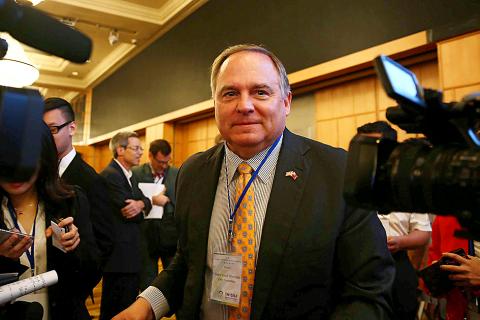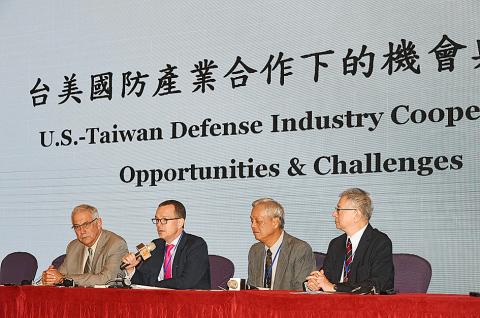The inaugural Taiwan-US Defense Business Forum was held yesterday in Kaohsiung to facilitate bilateral defense industry cooperation and ease Taiwan’s entry into the global defense supply chain.
The event at the Grand Hi-Lai Hotel was jointly organized by the Taiwan Defense Industry Development Association and the US-Taiwan Business Council.
The one-day event was part of the annual US-Taiwan Defense Industry Conference, a platform for dialogue on Taiwan’s national security needs, weapons procurement and defense cooperation that had been held every year in the US since 2002.

Photo: CNA
One attendee, retired lieutenant general Francis Wiercinski, a former US Army Pacific commander who is now senior vice president and managing director of US-based Cubic Corp, told reporters he was happy to participate in the event and conduct exchanges with partners in the region.
“We are all working with industry and trying to do better on both sides learning from each other,” Wiercinski said.
The forum’s focus on the shipbuilding, cybersecurity and aerospace industries reflects their importance to national security and their positive effect on the broader economy, Chinese Council of Advanced Policy Studies secretary-general Andrew Yang (楊念祖) said.

Photo: Chang Chung-yi, Taipei Times
The environment for bilateral defense industry cooperation is generally positive due to the policy of US President Donald Trump’s administration and long-term US strategic interests and values, panelists said.
Council president Rupert Hammond-Chambers said he has high hopes for Trump’s commitment to assisting Taiwan’s defense capabilities, adding that Trump has “good people” in his administration.
Taiwanese businesses are already part of the global supply chain, which bodes well for the efforts of the nation’s defense industry for such participation, he said.
“I see no reason Taiwan should not succeed here,” he added.
BAE Systems industrial strategy vice president Philip Georgariou said Taiwan has a “few challenges and many more opportunities.”
However, the level of protection for intellectual property and trade secrets in Taiwan is an abiding concern for potential defense industry partners, he said.
Taiwanese corporations that have dealings with or subsidiaries in China need to properly firewall their organizations, because due diligence requires US industrial entities to have assurances that their sensitive technologies and secrets are safe, he added.
Commitments to protect intellectual property and information security are “essential to trust,” Hammond-Chambers said.
“If I can take down one barrier, one issue, it is IP [intellectual property] and trade secrets,” he said.
Another point of concern is Taiwan’s defense spending, which as a share of GDP has remained low, Hammond-Chambers said, calling President Tsai Ing-wen’s (蔡英文) increases to the defense budget “modest” and “barely keeping up with inflation.”
Trump loomed large in Minister of Economic Affairs Shen Jong-chin’s (沈榮津) keynote speech.
Shen was effusive in his praise of the US president’s Taiwan policy, but he voiced carefully phrased concerns that Taiwan must adjust its policy according to shifting US priorities, saying that the nation has sustained “collateral damage” from Washington’s steel and aluminum tariffs against China.
Regarding defense spending as a share of GDP, Shen said the measurement does not take into account military personnel costs or force structure, and therefore presents an inaccurate reflection of Tsai’s commitment to national defense.
Lockheed Martin business development director for Asia-Pacific Robert Laing said there is significant opportunity for Taiwanese shipbuilders to cooperate with their US counterparts.
As Washington reorients its defense priorities from fending off terrorism to dealing with powerful rivals, the US Navy has renewed its interest in guided-missile frigates and anti-
submarine warfare, which match the Republic of China Navy’s needs, he said.
Democratic Progressive Party Legislator Liu Shyh-fang (劉世芳) said the Tsai administration plans to spend US$15.67 billion on the navy from this year to 2040.
While the naval program is currently focused on submarines, frigates, minelayers and amphibious transport docks, the navy would later move on to developing destroyers, landing helicopter docks, marine special operations craft and other ships, she said.
These measures would provide strong, sustainable demand for the domestic shipbuilding industry, she added.
However, during the question-and-answer session, association chairman Han Pi-hsiang (韓碧祥) stood up in the audience and issued a sharply worded critique of the government’s procurement policy.
Domestic shipbuilders are either “glutted to bursting or starving to death,” because government contracts have been sporadic and outsized, he said.
Under the current government procurement system, contractors have to complete large batches of ships before being paid, which is risky and drains them of funds, he added.
“Taiwan’s shipbuilding industry is a hard environment to survive in,” Han said. “I want to use this forum to communicate with the government and work out these problems.”
Additional reporting by CNA

Seventy percent of middle and elementary schools now conduct English classes entirely in English, the Ministry of Education said, as it encourages schools nationwide to adopt this practice Minister of Education (MOE) Cheng Ying-yao (鄭英耀) is scheduled to present a report on the government’s bilingual education policy to the Legislative Yuan’s Education and Culture Committee today. The report would outline strategies aimed at expanding access to education, reducing regional disparities and improving talent cultivation. Implementation of bilingual education policies has varied across local governments, occasionally drawing public criticism. For example, some schools have required teachers of non-English subjects to pass English proficiency

‘FORM OF PROTEST’: The German Institute Taipei said it was ‘shocked’ to see Nazi symbolism used in connection with political aims as it condemned the incident Sung Chien-liang (宋建樑), who led efforts to recall Democratic Progressive Party (DPP) Legislator Lee Kun-cheng (李坤城), was released on bail of NT$80,000 yesterday amid an outcry over a Nazi armband he wore to questioning the night before. Sung arrived at the New Taipei City District Prosecutors’ Office for questioning in a recall petition forgery case on Tuesday night wearing a red armband bearing a swastika, carrying a copy of Adolf Hitler’s Mein Kampf and giving a Nazi salute. Sung left the building at 1:15am without the armband and apparently covering the book with a coat. This is a serious international scandal and Chinese

TRADE: The premier pledged safeguards on ‘Made in Taiwan’ labeling, anti-dumping measures and stricter export controls to strengthen its position in trade talks Products labeled “made in Taiwan” must be genuinely made in Taiwan, Premier Cho Jung-tai (卓榮泰) said yesterday, vowing to enforce strict safeguards against “origin laundering” and initiate anti-dumping investigations to prevent China dumping its products in Taiwan. Cho made the remarks in a discussion session with representatives from industries in Kaohsiung. In response to the US government’s recent announcement of “reciprocal” tariffs on its trading partners, President William Lai (賴清德) and Cho last week began a series of consultations with industry leaders nationwide to gather feedback and address concerns. Taiwanese and US officials held a videoconference on Friday evening to discuss the

PERSONAL DATA: The implicated KMT members allegedly compiled their petitions by copying names from party lists without the consent of the people concerned Judicial authorities searched six locations yesterday and questioned six people, including one elderly Chinese Nationalist Party (KMT) member and five KMT Youth League associates, about alleged signature forgery and fraud relating to their recall efforts against two Democratic Progressive Party (DPP) legislators. After launching a probe into alleged signature forgery and related fraud in the KMT’s recall effort, prosecutors received a number of complaints, including about one petition that had 1,748 signatures of voters whose family members said they had already passed away, and also voters who said they did not approve the use of their name, Taipei Deputy Chief Prosecutor